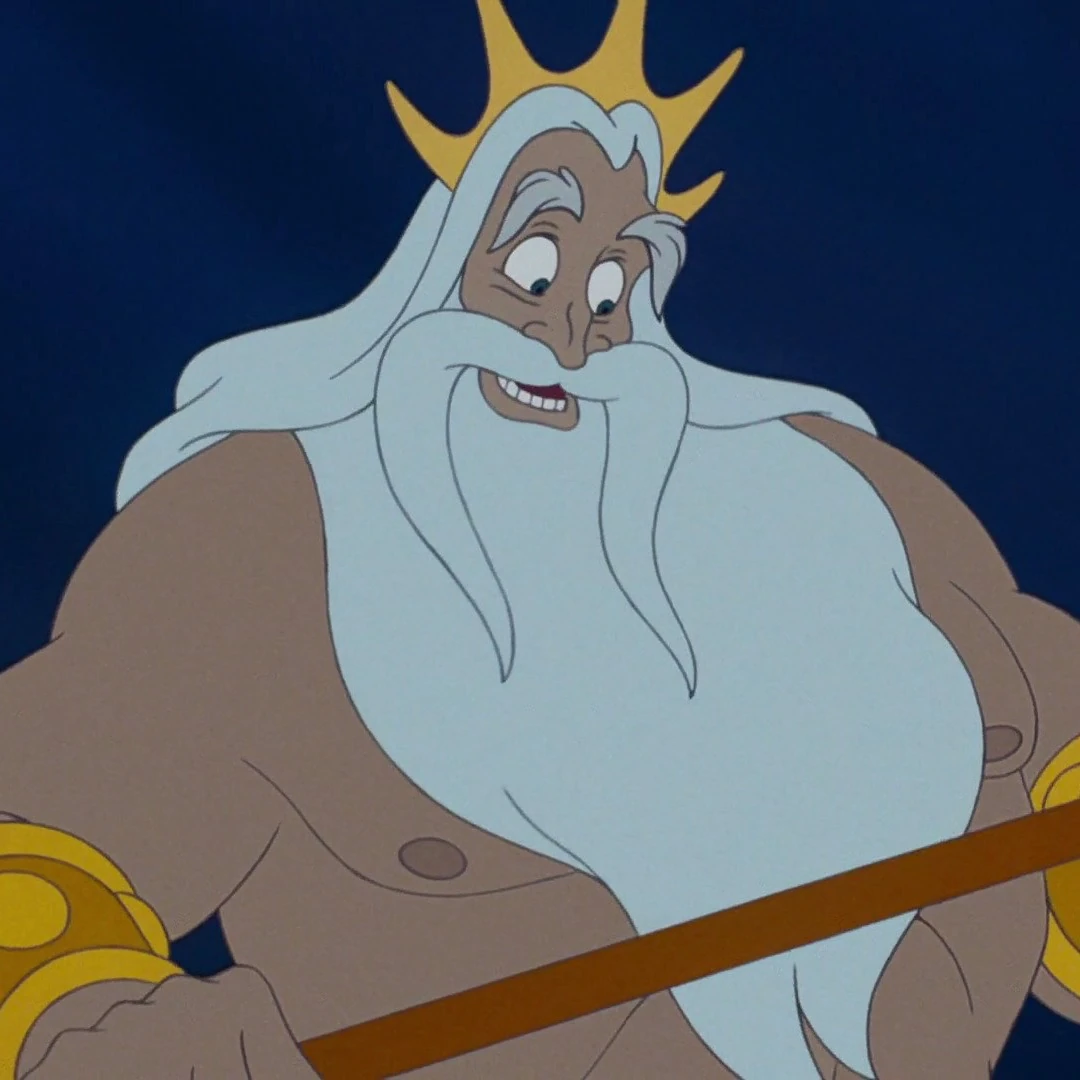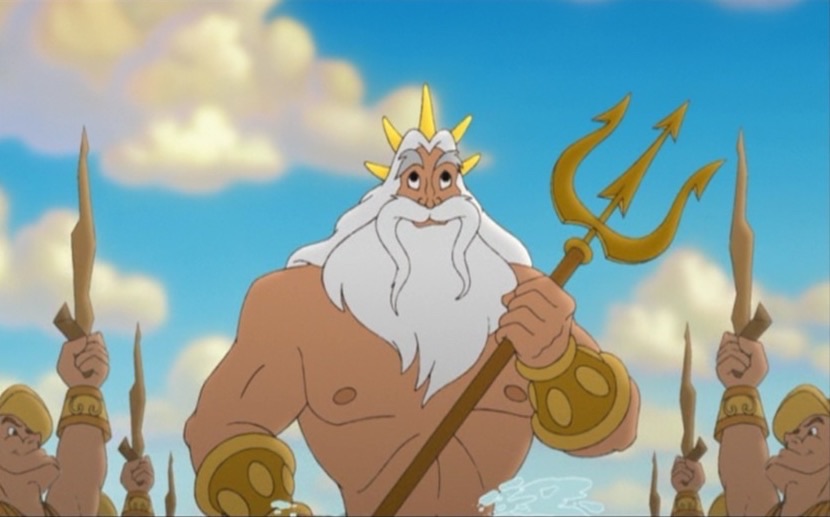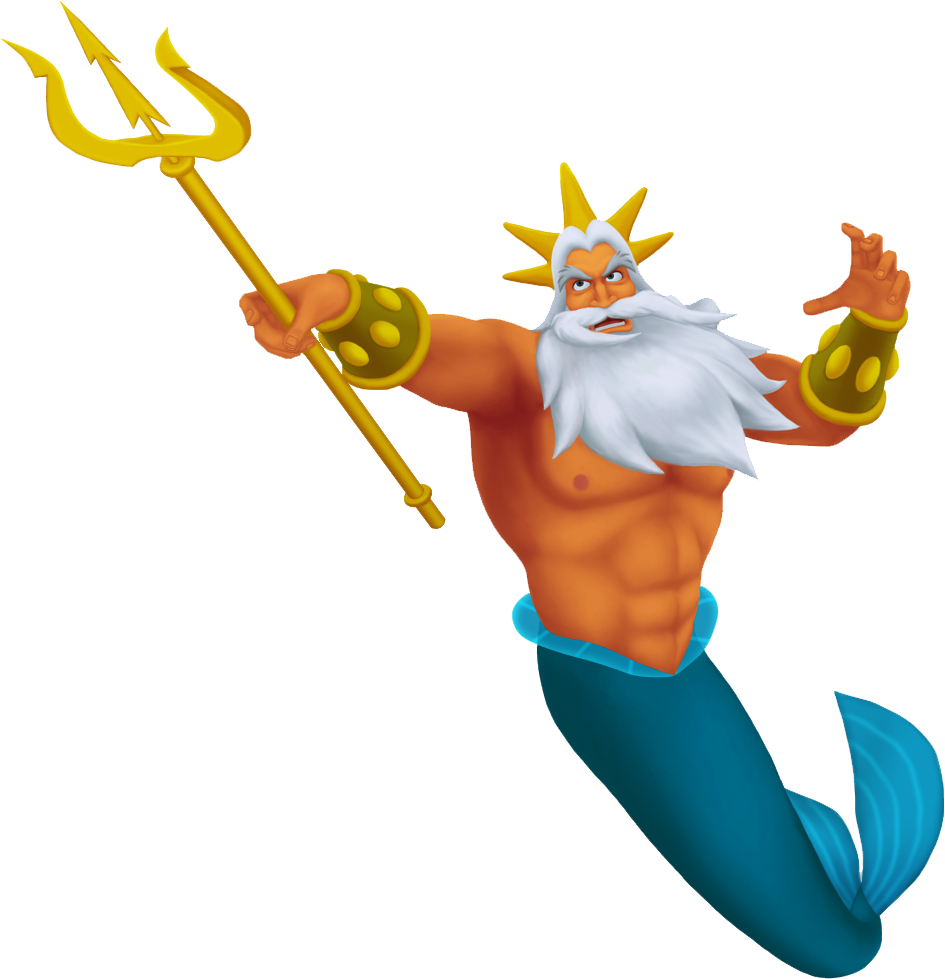King Triton: The Sea King's Enduring Legacy And Royal Reign
King Triton, the majestic ruler of the undersea kingdom of Atlantica, stands as one of Disney's most iconic and complex characters. Known universally as the Sea King, his presence looms large in the enchanting world of "The Little Mermaid," a figure of immense power, profound love, and deeply rooted convictions. From his mythical origins in ancient Greek lore to his nuanced portrayal in animated and live-action films, Triton embodies the very essence of oceanic authority and the universal struggles of fatherhood.
More than just Ariel's father, King Triton is a character whose journey from strict guardian to understanding patriarch resonates with audiences worldwide. His story explores themes of prejudice, acceptance, and the delicate balance between protecting one's children and allowing them to forge their own paths. This article delves deep into the multifaceted character of King Triton, uncovering his history, powers, relationships, and the indelible mark he has left on popular culture.
Table of Contents
- King Triton: A Royal Character Profile
- The Mythological Roots of King Triton
- Ruler of Atlantica: King Triton's Domain and Authority
- The Father Figure: King Triton's Parental Journey
- The Voice and Evolution of King Triton
- Key Relationships in King Triton's Life
- Lessons Learned: King Triton's Journey of Acceptance
- The Enduring Legacy and Cultural Impact of King Triton
King Triton: A Royal Character Profile
King Triton is not merely a figurehead but a character with a rich background and defining traits. As the central paternal figure in "The Little Mermaid" universe, his identity is deeply intertwined with his role as a sovereign and a father.
| Attribute | Description |
|---|---|
| Full Name | King Triton |
| Titles | Sea King, Ruler of Atlantica, King of the Oceans |
| Species | Merman |
| Family |
|
| Key Powers | Hydrokinesis, Electrokinesis (via Trident), control over marine life, immense strength, magical abilities. |
| First Appearance | "The Little Mermaid" (1989 animated film) |
| Voice Actors |
|
| Personality Traits | Protective, authoritative, temperamental, loving, prejudiced (initially), wise (eventually), strict, devoted. |
The Mythological Roots of King Triton
While Disney's King Triton is a fictional character, his name and many of his attributes are directly inspired by ancient Greek mythology. In Greek lore, Triton is a mythical creature commonly depicted as a merman or a sea god. According to the Greek poet Hesiod's "Theogony," Triton was the son of Poseidon, the mighty god of the sea, and Amphitrite, the personification of the sea itself. This lineage immediately establishes a connection to immense power and divine authority over the oceans.
The mythological Triton was known as the "ruler (possessor) of the depths of the sea" and was described as either "dreadful" or "mighty" (δεινός), an epithet given to him by Hesiod. He was also revered in antiquity for his role as a messenger of the sea, often depicted blowing a conch shell to calm or stir the waves. He dwelt with his parents in underwater golden palaces, a detail that clearly influenced Disney's depiction of Atlantica as a grand, opulent kingdom. The Disney character's strong resemblance to Poseidon, particularly in his commanding presence, long white beard, and powerful trident, further solidifies this mythological link. This deep-rooted connection to ancient tales of sea deities lends a timeless gravitas to Disney's King Triton, making him feel like a character plucked from the very legends of the deep.
Ruler of Atlantica: King Triton's Domain and Authority
As the King of Atlantica, King Triton holds absolute dominion over his undersea kingdom and, by implication, across the entirety of the oceans. His rule is characterized by a strong sense of order and a deep commitment to the well-being of his merpeople. He is a monarch who commands respect, not just through his formidable power, but also through his long-standing reign and the perceived wisdom that comes with it. His kingdom, Atlantica, is depicted as a vibrant and bustling metropolis, a testament to his successful governance.
King Triton's authority is not merely symbolic; it is actively exercised. He enforces laws, makes decisions that affect his subjects, and protects his realm from external threats. His presence alone is enough to inspire awe and obedience among the merpeople. This immense power, however, also comes with the heavy burden of responsibility, especially when it clashes with the rebellious spirit of his youngest daughter, Ariel. His reign is one of both strength and, at times, a rigid adherence to tradition, particularly concerning his deep-seated prejudice against the human world.
His Majestic Trident: Symbol of Power
Central to King Triton's identity and power is his magnificent golden trident. This iconic weapon is not just a prop; it is the very embodiment of his authority and magical capabilities. The trident allows King Triton to manipulate water, summon powerful energy blasts, and even transform creatures, as seen when he turns Ursula's victims back into merpeople or, most famously, transforms Ariel into a human. The trident is a direct visual and functional nod to Poseidon's own weapon in Greek mythology, further cementing Triton's status as a formidable sea deity.
The trident's power is immense, almost limitless, within the aquatic realm. It is so potent that its loss or misuse could spell disaster for Atlantica, as demonstrated when Ursula gains control of it. This makes the trident not just a tool of power but also a critical plot device, highlighting the stakes involved in the conflict between King Triton and his adversaries. It represents the ultimate authority of the sea, and its wielder is truly the ruler of the depths.
The Father Figure: King Triton's Parental Journey
Beyond his royal duties, King Triton is most profoundly defined by his role as a father. He is the widowed patriarch of seven daughters: Attina, Alana, Adella, Aquata, Arista, Andrina, and, of course, the youngest, Ariel. His relationship with his daughters, particularly Ariel, forms the emotional core of "The Little Mermaid" narrative. He is referred to as "Daddy" or "Father" by them all, highlighting the personal, familial bond despite his regal stature.
Triton is fiercely protective of his daughters, a trait that often manifests as overprotectiveness and strictness, especially after a significant family tragedy. This protective instinct, while born of love, frequently leads to conflict, particularly with Ariel, who yearns for independence and exploration beyond the confines of Atlantica.
Loss and the Path to Strictness
The prequel film, "The Little Mermaid: Ariel's Beginning," provides crucial insight into King Triton's past and the origins of his strict demeanor. Initially, Triton is depicted as a devoted and loving father and husband, deeply connected to his wife, Queen Athena, and their daughters. However, a tragic incident involving humans leads to Queen Athena's untimely death. This devastating loss profoundly impacts Triton, causing him to become much more strict and develop a deep-seated dislike and prejudice against the human world. He bans music from Atlantica, associating it with the joy that was lost, and imposes rigid rules to protect his daughters from what he perceives as the dangers of the surface.
This backstory humanizes King Triton, explaining his seemingly harsh rules and overprotective nature not as arbitrary cruelty, but as a misguided attempt to shield his family from further pain. His grief transforms him from a jovial king into a stern, almost authoritarian figure, constantly struggling with treading the fine line between parental authority for discipline and protectiveness, and the risk of emotional abuse when dealing with his teenage daughter, Ariel.
Ariel and the Human World: A Father's Conflict
The core conflict of "The Little Mermaid" revolves around King Triton's strained relationship with Ariel, fueled by her "obsession with humans." His command, "Mighty King Triton warns Ariel to never swim to the surface again," underscores his fear and his attempts to control her curiosity. He views the human world as dangerous and destructive, a belief reinforced by his personal tragedy. When he discovers Ariel's grotto filled with human artifacts, his anger erupts, leading him to destroy her treasured collection with his trident. This act, while stemming from fear and a desire to protect, is seen by Ariel as a profound betrayal and emotional abuse, driving her further away and into Ursula's clutches.
This pivotal moment highlights the generational gap and the clash between tradition and exploration. Triton's journey throughout the film is one of learning to overcome his prejudice and understand his daughter's desires, even if they diverge from his own. His ultimate act of sacrifice for Ariel, taking her place in Ursula's deal, demonstrates the depth of his love and his willingness to change for his child's happiness.
The Voice and Evolution of King Triton
The character of King Triton has been brought to life by several talented voice actors across his various animated and live-action appearances, each contributing to his enduring portrayal. In the original 1989 animated feature film and its 2000 sequel, "The Little Mermaid II: Return to the Sea," King Triton was voiced by the late Kenneth Mars. Mars's deep, booming voice perfectly captured Triton's regal authority, his booming temper, and his underlying warmth and love. His performance established the definitive vocal identity for the character, making him instantly recognizable.
For the 2008 prequel, "The Little Mermaid: Ariel's Beginning," the role of King Triton was taken over by Jim Cummings. Cummings, a prolific voice actor known for a vast array of characters, brought a slightly different nuance to the younger, pre-grief Triton, as well as the hardened version seen after Athena's death. His portrayal helped to flesh out the character's emotional arc and provide context for his later strictness. Most recently, in the 2023 live-action film adaptation of "The Little Mermaid," the role of King Triton was portrayed by the esteemed actor Javier Bardem. Bardem brought a new gravitas and intensity to the character, grounding his power and emotional struggles in a more realistic, human (or merman) performance. The evolution of King Triton through these different portrayals showcases his adaptability and timeless appeal across various media, continually introducing him to new generations of fans.
Key Relationships in King Triton's Life
King Triton's character is significantly shaped by his relationships, which highlight his various facets as a ruler, father, and widower. These connections are crucial to understanding his motivations and emotional journey.
- Queen Athena: His late wife, Queen Athena, is a foundational figure in Triton's life, even in her absence. Her death is the catalyst for his transformation from a loving, music-embracing ruler into a strict, anti-human monarch. Her memory underscores his protective instincts and his deep-seated grief.
- His Seven Daughters (Attina, Alana, Adella, Aquata, Arista, Andrina, Ariel): As a widowed father, his daughters are the center of his world. He is fiercely devoted to them, though his methods of protection often clash with their individual desires, particularly Ariel's. He views them as precious and vulnerable, leading to his overprotective nature.
- Ariel: The most complex and central relationship. Ariel's rebellious spirit and fascination with the human world directly challenge King Triton's authority and deeply held beliefs. Their conflict is the heart of the original film, culminating in a powerful moment of understanding and sacrifice. He struggles with treading the fine line between parental authority for discipline and protectiveness, and emotional abuse when dealing with his teenage daughter, Ariel.
- Sebastian: Triton's royal advisor and trusted confidant. Sebastian often acts as an intermediary between Triton and Ariel, attempting to manage Ariel's rebellious tendencies and report back to the King. Their relationship is one of loyalty and mutual respect, though Sebastian often bears the brunt of Triton's temper.
- Ursula: The sea witch and Triton's arch-nemesis. Their rivalry is rooted in a past conflict, with Ursula seeking to usurp Triton's throne and power. Ursula manipulates Ariel to get to Triton, ultimately leading to a direct confrontation where Triton's power is challenged and nearly lost.
Lessons Learned: King Triton's Journey of Acceptance
One of the most compelling aspects of King Triton's character arc is his profound transformation throughout "The Little Mermaid." Initially, he embodies rigid authority and deep-seated prejudice against humans, a direct consequence of his past trauma. His worldview is black and white: humans are dangerous, and the surface world is forbidden. This perspective is challenged by Ariel's unwavering love for Prince Eric and her desire to be part of their world.
The turning point for King Triton comes when he witnesses Ariel's genuine happiness and love for Eric, and when he is forced to confront the consequences of his own actions and prejudices. His ultimate act of self-sacrifice, giving up his power and freedom to save Ariel from Ursula, is a testament to the depth of his love. This act is followed by his decision to transform Ariel into a human permanently, allowing her to pursue her dreams. This shows how he changes from prejudice to acceptance and teaches important life lessons in the Disney film. He learns that true love transcends species and that sometimes, the greatest act of parental love is to let go and trust your children to make their own choices, even if they lead to an unfamiliar path. His journey is a powerful narrative about overcoming fear, embracing change, and understanding that love can bridge even the widest divides.
The Enduring Legacy and Cultural Impact of King Triton
King Triton’s character in "The Little Mermaid" has left an indelible mark on popular culture, solidifying his place as one of Disney's most memorable figures. His reign as the Sea King, as well as his strained relationship with humans, brings depth and complexity to the story, elevating it beyond a simple fairy tale. He represents the classic archetype of the powerful, yet flawed, patriarch who must learn to adapt and grow. His iconic appearance – the muscular merman with a flowing white beard, golden crown, and powerful trident – is instantly recognizable and has been widely parodied and celebrated across various media.
The legacy of King Triton extends beyond his role in the films. He has become a symbol of parental authority, the challenges of raising independent children, and the struggle to overcome ingrained prejudices. His story resonates because it touches upon universal themes of family, rebellion, love, and acceptance. He teaches audiences that even the most powerful figures can learn and change, demonstrating the importance of empathy and understanding over rigid rules and fear. His character adds significant emotional weight to "The Little Mermaid," making it a timeless tale that continues to captivate audiences worldwide.
Beyond the Screen: King Triton in Pop Culture
King Triton's influence extends far beyond the animated and live-action films. He features prominently in Disney theme park attractions, stage adaptations, and various merchandise, cementing his status as a beloved character within the Disney pantheon. His image is synonymous with the grandeur and mystery of the ocean, and his story continues to be retold and reinterpreted, maintaining its relevance for new generations. The character's ability to evolve, as seen in the nuanced portrayal in the 2023 live-action film, ensures that King Triton remains a compelling and integral part of "The Little Mermaid" franchise, a true icon of the deep.
Conclusion
King Triton, the formidable Sea King and devoted father, is a character of immense depth and enduring appeal. From his roots in ancient Greek mythology to his central role in Disney's "The Little Mermaid," he embodies power, responsibility, and the complex journey of parenthood. His transformation from a strict, prejudiced ruler to an accepting, loving father who sacrifices everything for his daughter's happiness is a powerful testament to the transformative power of love and understanding.
His story teaches us that even the mightiest among us can learn and grow, demonstrating the importance of empathy, challenging preconceived notions, and allowing those we love to follow their own destinies. King Triton's legacy as the king of Atlantica and Ariel's father will undoubtedly continue to inspire and resonate with audiences for generations to come. What are your favorite moments of King Triton's reign? Share your thoughts in the comments below, and explore more articles about the enchanting world of Disney's "The Little Mermaid" on our site!

King Triton | Disney Wiki | Fandom

King Triton - Disney Wiki

King Triton - Disney Wiki